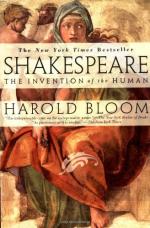
|
| Name: _________________________ | Period: ___________________ |
This test consists of 15 multiple choice questions and 5 short answer questions.
Multiple Choice Questions
1. How does Helena conceive Bertram's child?
(a) She is raped by him.
(b) She marries him.
(c) She seduces him.
(d) By tricking him.
2. Whose philosophy does Bloom say Iago embodies?
(a) Nietzsche's.
(b) Hegel's.
(c) Aristotle's.
(d) Plato's.
3. What does Iago triumph over, in Bloom's interpretation?
(a) Himself.
(b) Shallower evil characters.
(c) Conventional morality.
(d) Subordinate races.
4. What gives "Winter's Tale" its supernatural quality, according to Bloom?
(a) Hermione's resurrection.
(b) Leontes' visions.
(c) Polixenes' ubiquity.
(d) Leontes' madness.
5. What does Iachino want from Imogen?
(a) To make her queen.
(b) To convince her to betray her husband's political power.
(c) To marry her.
(d) To seduce her or see her killed.
6. What id Dryden's objection to Caliban's depiction?
(a) That he is only truly savage under the influence of drink, and cannot be bestial otherwise.
(b) That he is still a European political persona.
(c) That a half-man is not a natural man.
(d) That he cannot be savage if he can speak.
7. How does the porter describe the effects of alcohol?
(a) It blinds people to their own death, and perpetuates their genetic lines.
(b) It makes people equal, but removes the ability to have sex.
(c) It reveals people's true characters.
(d) It confuses family lines in improvident matches.
8. What makes "Winter's Tale" jarring, in Bloom's interpretation?
(a) Its nihilism.
(b) Its piety.
(c) Its hostility.
(d) Its originality.
9. What does Nietzsche say Hamlet's problem was?
(a) Madness.
(b) Fear.
(c) Thinking too well.
(d) Emasculation.
10. What does Bloom say is the moral of "All's Well That Ends Well"?
(a) That for men, women are all the same in the dark.
(b) That love is always ultimately destructive.
(c) That love is the only thing keeping people from savagery.
(d) That war is the condition for which people seem to have been created.
11. What does Bloom say "The Merry Wives of Windsor" might have been designed to do?
(a) Urge the government to make reforms.
(b) Propitiate the queen with light humor.
(c) Resolve personal quandaries of Shakespeare's.
(d) Make a lot of money for the theatre company.
12. What does Theseus give away in "Two Noble Kinsmen"?
(a) His daughter.
(b) His throne.
(c) His lands.
(d) His wife.
13. How does Auden describe Iago?
(a) As a devil.
(b) As karmic vengeance.
(c) As the subterranean soul of Western culture.
(d) As a practical joker.
14. What character does Bloom say follows Shakespeare's "Pericles"?
(a) Melville's Ahab.
(b) Milton's Adam.
(c) Hawthorne's Hester Prynne.
(d) Milton's Satan.
15. How does Bloom say "Henry V" has been used in England?
(a) As a patriotic statement.
(b) As anti-communist propaganda.
(c) As a criticism of the French.
(d) As propaganda for the socialist state.
Short Answer Questions
1. Why does Janet Adelman say that Cordelia had to be murdered in "King Lear"?
2. What aspect of Nietzsche's philosophy does Iago embody, according to Bloom?
3. What is Bloom's complaint about "Henry VIII"?
4. What does Bloom say he suspects Shakespeare of, in "Henry V"?
5. How does Bloom characterize the end of "Measure for Measure"?
|
This section contains 531 words (approx. 2 pages at 300 words per page) |

|




